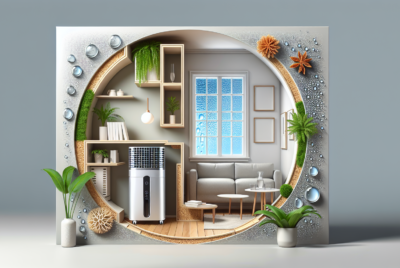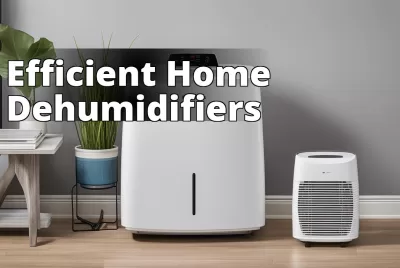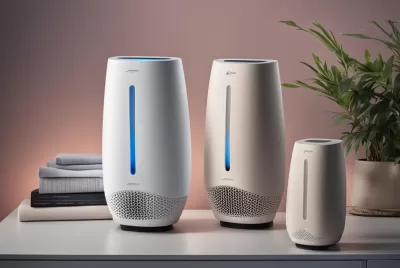Comprehensive Guide: Air Purifier vs Humidifier vs Dehumidifier
"We may earn a commission for purchases made using our links. Please see our disclosure to learn more."
Welcome, fellow indoor air quality enthusiasts! If you’re reading this, you’re likely as invested in creating a healthy and comfortable indoor environment as I am. So let’s explore the fascinating world of air purifier vs humidifier vs dehumidifier, as well as when to use two or all three as part of your air quality management.
Introduction
Just imagine bringing the fresh, clean air from a beautiful day outdoors into your home. Sounds great, right? It’s not only possible but a mission that air purifiers, humidifiers, and dehumidifiers tirelessly perform. These devices are our silent allies, continually working to enhance the quality of our indoor air. But what exactly does each one do? And which one is the best fit for your specific needs? Let’s dive in and find out!
Decoding the Devices: Air Purifier vs Humidifier vs Dehumidifier
You may be thinking, “Aren’t these all just ways to improve air quality?” Not exactly. Each has a unique function and purpose. Let’s break it down.
Defining an Air Purifier
Think of air purifiers as small vacuum cleaners for airborne particles. They pull in air, filter out pollutants such as dust, allergens, bacteria, and even odors, and then release the purified air back into the room. If you’re concerned about airborne pollutants in your home or workspace, an air purifier might be just what you need.
Understanding a Humidifier
Ever experience that unpleasant dry skin feeling in the winter? That’s the result of the lower moisture content in cold air. Humidifiers combat this issue by adding moisture to your indoor environment. They can help maintain healthy skin, throat, and lips and even help alleviate some symptoms of the common cold or sinus congestion. If dry air is your nemesis, a humidifier can be a fantastic solution.
Unraveling the Dehumidifier
While humidifiers tackle dryness, dehumidifiers handle excess moisture. If you live in a damp climate or have a basement that feels a little too muggy, a dehumidifier can help. By extracting excess moisture from the air and collecting it as water for you to empty, dehumidifiers can prevent issues like mold and mildew growth, which can affect both your health and your home.
In a nutshell, air purifiers cleanse the air, humidifiers add moisture, and dehumidifiers remove it. Now that we’ve defined these devices let’s delve deeper into their unique benefits and applications.
Air Purifier vs Humidifier vs Dehumidifier: How Do They Work?
Ever wondered about the mechanics of these air quality enhancers? Let’s lift the veil and dive into the specifics of how each of them works.
Role of an Air Purifier
An air purifier is like a meticulous housekeeper for your home’s air, constantly tidying up and eliminating unwelcome guests. As it pulls in your room’s air, it passes it through a filter – or a series of filters. These filters, usually made of paper, fiber, or mesh, trap pollutants such as dust, pollen, and bacteria. Some air purifiers even have activated carbon filters that can absorb odors, smoke, and certain gases. After this filtering process, the air purifier then circulates the clean air back into your room. It’s like a continuous cycle of freshness!
Function of a Humidifier
Humidifiers work like little personal rainclouds for your indoor space. They add moisture to the air in the form of water vapor, increasing the humidity levels in your room. There are a few types of humidifiers, but most work by either heating water to create steam or breaking water down into a fine mist. This moisture is then released into the room, helping to prevent the dryness that can irritate many parts of the body.
Dehumidifier: Its Purpose and Operation
A dehumidifier is like a thirsty companion that can’t get enough of water – in a good way. It operates by sucking in air from your room, then cooling it down. As the air cools, moisture condenses and turns into water droplets, which are collected into a tank that you periodically empty. The dehumidifier then reheats the air and sends it back into the room minus the excess moisture. This can help maintain a comfortable and healthy humidity level in your space.
Air Purifier vs Humidifier vs Dehumidifier: Interplay and Individual Benefits
Now, let’s talk benefits. How do these devices work together, and what advantages do they offer individually? Let’s explore.
Advantages of Using an Air Purifier
Air purifiers can be lifesavers, especially for those of us with allergies or respiratory issues. By reducing the concentration of airborne pollutants, they can help alleviate allergy symptoms, reduce asthma triggers, and even minimize your chances of catching airborne diseases. Plus, who doesn’t love walking into a room that smells fresh and clean?
The Need for a Humidifier
Humidifiers are heroes for those of us in dry climates or dealing with dry indoor air. By maintaining optimal humidity levels, they can help prevent dry skin, soothe dry throats and sinuses, and even reduce snoring. Plus, a good humidifier can help keep your wooden furniture from cracking!
The Role of Dehumidifiers
Dehumidifiers, on the other hand, are must-haves for those living in damp climates or spaces. By keeping humidity levels in check, they can prevent the growth of mold and mildew, which can damage your home and affect your health. They can also help get rid of that musty odor that often accompanies damp environments.
Each of these devices plays a unique role in creating a healthy indoor environment. Understanding their functions and benefits can help you decide which one – or perhaps a combination – would be best for your specific needs. But, we’re not stopping here. Let’s take our exploration a step further.
Practical Applications of Air Purifiers, Humidifiers, and Dehumidifiers
To make the most out of these devices, let’s examine the scenarios where they truly shine.
Practical Applications of an Air Purifier
If you’re living in a city with high pollution or a neighborhood with a lot of dust, an air purifier is your knight in shining armor. Similarly, if you’re sharing your space with furry friends, an air purifier can help manage the pet dander that causes many people allergies. Air purifiers are also excellent for those with respiratory issues, such as asthma, as they can reduce potential triggers in the air.
When to Use a Humidifier
Remember those chilly winter months when the air gets so dry your skin starts flaking? That’s when a humidifier steps in. It can help alleviate dry skin, chapped lips, and even reduce sinus problems related to dry air. They are also handy during a cold or flu, as they can help soothe coughs and congested sinuses.
Situations for a Dehumidifier
For those living in humid climates or with damp basements, a dehumidifier is a must-have. By reducing excess moisture, it can help prevent mold and mildew growth, and eliminate that musty smell often found in damp spaces.
Practical Use Cases for Using Two Devices Together
If you’re living in an urban area with high pollution and suffer from dry skin, a combination of an air purifier and a humidifier would be beneficial. Similarly, in a damp and dusty basement, an air purifier coupled with a dehumidifier can significantly improve the air quality.
The Trio in Action: When to Use All Three Together
For some of us, the optimal solution might involve all three devices. Suppose you live in a polluted city, have a damp living room, and dry bedrooms during winter. An air purifier could clean the polluted city air, a dehumidifier could tackle the dampness in your living room, and humidifiers could add moisture to your bedrooms.
Synergistic Benefits: Using Air Purifiers, Humidifiers, and Dehumidifiers Together
The combined use of these devices can create an optimal indoor environment. Let’s delve into this synergy.
Seasonal Benefits of the Trio
In dry winters, a humidifier can help add moisture while an air purifier can keep any closed-up, stale air fresh and clean. In humid summers, a dehumidifier can maintain a comfortable humidity level, while an air purifier continues to cleanse the air of pollutants.
Room-specific Benefits of Air Purifiers, Humidifiers, and Dehumidifiers
Different rooms in your home can have different needs. You might need a dehumidifier in your damp basement, a humidifier in your dry bedroom, and air purifiers in the living areas to handle dust, pet dander, or city pollution.
Enhancing Overall Indoor Air Quality
Together, these devices can maintain optimal humidity levels, remove pollutants, and provide fresh, clean air to breathe. This trio can truly create an ideal indoor environment, making your home a haven of comfort and health. So, why not get the best of all worlds?
Health Impacts: Air Purifier vs Humidifier vs Dehumidifier
What does this mean for you in terms of health? Here’s the breakdown.
Health Benefits of an Air Purifier
Air purifiers, especially those with HEPA filters, can significantly reduce allergens such as dust mites, pet dander, and pollen. This reduction can help manage allergies and asthma symptoms, improving respiratory health. By removing airborne bacteria and viruses, they can also reduce the risk of airborne diseases.
Health Advantages of a Humidifier
By preventing dryness, humidifiers can help alleviate symptoms of the common cold, flu, and sinus infections. Dry skin, lips, and throats can also benefit from added moisture. By maintaining a proper humidity level, you can keep your respiratory tract well-lubricated and more resistant to harmful particles.
Health Impacts of a Dehumidifier
Dehumidifiers, by maintaining a healthy humidity level, can prevent the growth of mold and mildew – notorious for causing respiratory issues. By reducing dampness, they can also alleviate symptoms of asthma and allergies, offering a healthier living environment.
Combined Health Benefits of Using Air Purifier, Humidifier, and Dehumidifier
The trio, working together, can create an environment that’s not just comfortable, but health-boosting as well. With purifiers cleaning the air, humidifiers preventing dryness, and dehumidifiers keeping dampness in check, you’re setting the stage for optimal respiratory health and well-being.
Air Purifier, Humidifier, Dehumidifier: Which One is Right for You?
The big question is – which device, or combination of devices, suits you the best?
Choosing Between an Air Purifier, Humidifier, and Dehumidifier
Your personal needs will dictate the answer. Do you have allergies or live in a polluted area? An air purifier could be your best ally. Suffer from dry skin during winter? A humidifier might be your solution. Live in a damp area or have a mold issue in your basement? Look towards a dehumidifier.
Essential Factors When Choosing Air Purifier vs Humidifier vs Dehumidifier
Consider factors like your local climate, specific health concerns, size of your home, and even your budget. It’s not a one-size-fits-all solution. Each device has its unique benefits, and the best choice depends on your individual circumstances.
Conclusion
Air purifier vs humidifier vs dehumidifier – they all play vital roles in maintaining a healthy and comfortable home environment. Whether used separately or in conjunction, they offer a way to improve indoor air quality and enhance your health. Ultimately, the choice between an air purifier, humidifier, or dehumidifier comes down to your personal needs. Here’s to breathing easier and living healthier!




